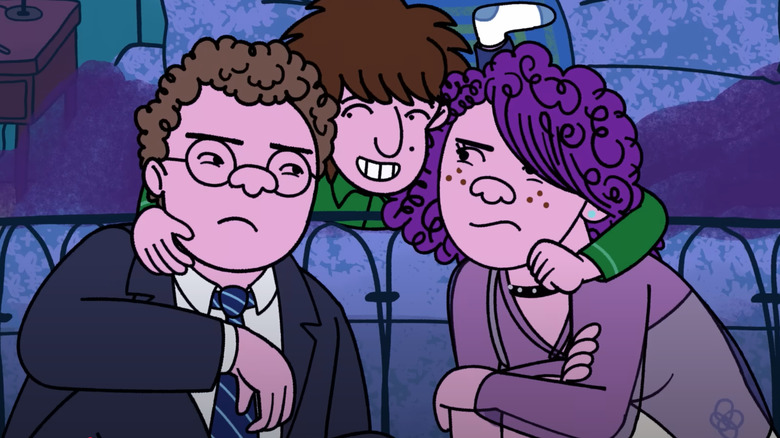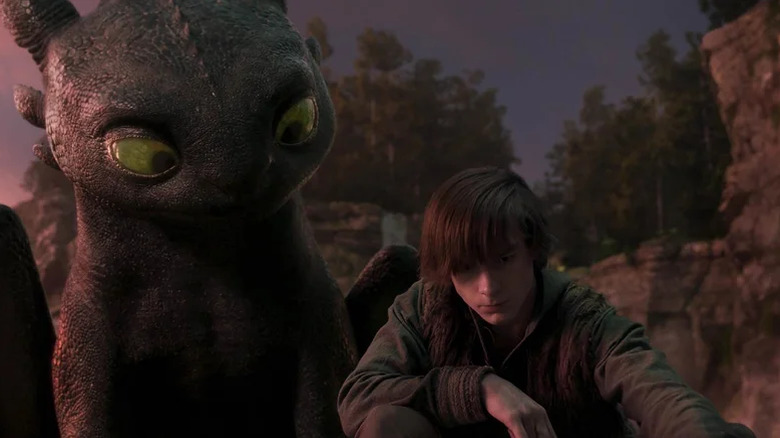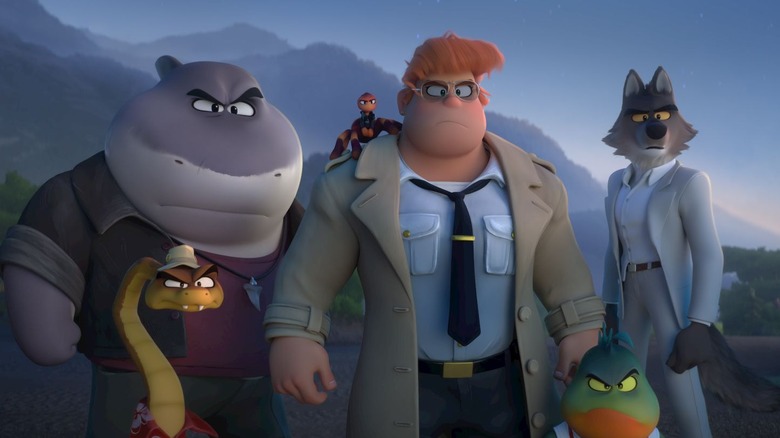BoJack Horseman's Creator Has A New Show With A Disclaimer That Could Become Common In Hollywood
"BoJack Horseman" redefined adult animation in the 2010s. In doing so, it also paved the way for shows that have further experimented with different tones and genres, taking advantage of the medium to tell unique and diverse stories (like "Common Side Effects" and "Pantheon"). Now, "BoJack Horseman" creator Raphael Bob-Waksberg is back with another animated series, titled "Long Story Short," and it's one of the best new shows of 2025.
"Long Story Short" is both completely unlike "BoJack Horseman" (it's much less of an industry satire and it features strictly human characters) while still being quite similar in terms of how it explores dysfunctional family dynamics. The show follows the Schwooper siblings and examines how their experiences growing up in a Jewish middle-class household impacted them as adults, teens, and children. It's a cartoon full of gripping drama and hilariously absurd comedy, all while using the medium of animation to tell stories that couldn't be done in live-action (like an incident involving a literal wolf invasion of a school) — and the whole thing starts with a brilliant and brutal twist in its very first episode.
Arguably, though, the most important thing about "Long Story Short" is what comes at the end of every episode: a disclaimer stating "This Programme Was Made By Humans." At a time when AI poses an existential threat to the movie and TV industry, as well as a very real danger to our planet, this is a great element to include, and it may yet become common in the near future.
Studios are fighting back against AI
"As a statement of value, it was worth saying out loud, 'This is important to us,'" Waksberg told IndieWire. "What I love about the show is that it is made by humans."
"Long Story Short" is not the only title that's featured an anti-AI disclaimer of late. Earlier this year, Universal Pictures did something similar, adding a legal threat against AI training programs to "The Bad Guys 2," "How to Train Your Dragon," and "Jurassic World Rebirth." The warning reads, in all-caps:
"THIS WORK MAY NOT BE USED TO TRAIN AI. ALL RIGHTS IN THIS WORK ARE RESERVED FOR PURPOSES OF LAW IN ALL JURISDICTIONS PERTAINING TO DATA MINING OR AI TRAINING, INCLUDING BUT NOT LIMITED TO ARTICLE 4(3) OF DIRECTIVE (EU) 2019/790."
While the disclaimer at the end of "Long Story Short" celebrates the work done by human animators, this move by Universal is a direct attack against AI engines that try and digest all of the internet in order to train their AI slop machines. Everyone from Meta and Nvidia to ChatGPT and Google are doing this in the name of "training," which amounts to them simply stealing and replicating copyright-protected work.
To be sure, at a time when studios' top brass are desperately trying to shove AI down our throats as a way of cutting costs, it's encouraging to see the public pushback is having an effect. Indeed, it's gotten so strong that Disney even pulled back on its plans to use AI in its live-action "Moana" remake and "Tron: Ares" for fear of a negative backlash.
This also comes at a time when the global box office is facing an existential threat and may never fully recover from the pandemic, which threatens to change moviegoing as we know it. While theatrical releases may only continue to become more spectacle-based (with theaters placing a strong focus on films designed for premium formats and IMAX screens), these "made by humans" labels and anti-AI disclaimers may nevertheless become more and more common, with more and more movies using the fact they were made entirely by humans as a selling point. But with all that being said, are disclaimers like this actually useful in a legal sense?
Will these anti-AI disclaimers actually change anything?
Though directly addressing AI is a good show of force, and as nice as it is to see series like "The Studio" flat-out attacking and mocking AI as a way of expressing a sentiment shared by much of Hollywood, the truth is that the genie has already been let out of the bottle. In other words, these disclaimers can't really do much, legally speaking.
For instance, the Directive 2019/790 quoted in the Universal Pictures warning refers to an AI copyright-compliance policy established by the European Union. The problem is, that policy (or something identical) is non-existent in the U.S. and can't really be applied domestically.
Per Vulture, streamers have also updated their terms-of-service agreements to deal with AI, with Disney+ stating that users can't "engage in any of the foregoing in connection with any use, creation, development, modification, prompting, fine-tuning, training, benchmarking or validation of any artificial intelligence or machine learning tool, model, system, algorithm, product or other technology." Meanwhile Paramount+ states, "We reserve the right to prevent third parties from text and data mining of Content and any information on the Service." Even Peacock prohibits the use of any content "for the purpose of directly or indirectly training, developing or improving a software tool or service, including any artificial intelligence tool, model, system or platform."
However, according to Vulture, exports in AI rights-tracking say that it is virtually impossible to prove that copyrighted material, such as images from "Jurassic World Rebirth," was used to train AI. One can readily show that an AI engine duplicates copyrighted material (which is very illegal), but the training aspect lies in a legally gray area since it happens before anything is actually produced. Hence, despite being done in good faith, these anti-AI training warnings may simply be the new anti-piracy warning — something that's enforceable, sure, but not something that prevents or deals with the greater issue in any substantial way.
"Long Story Short" is now streaming on Netflix.


